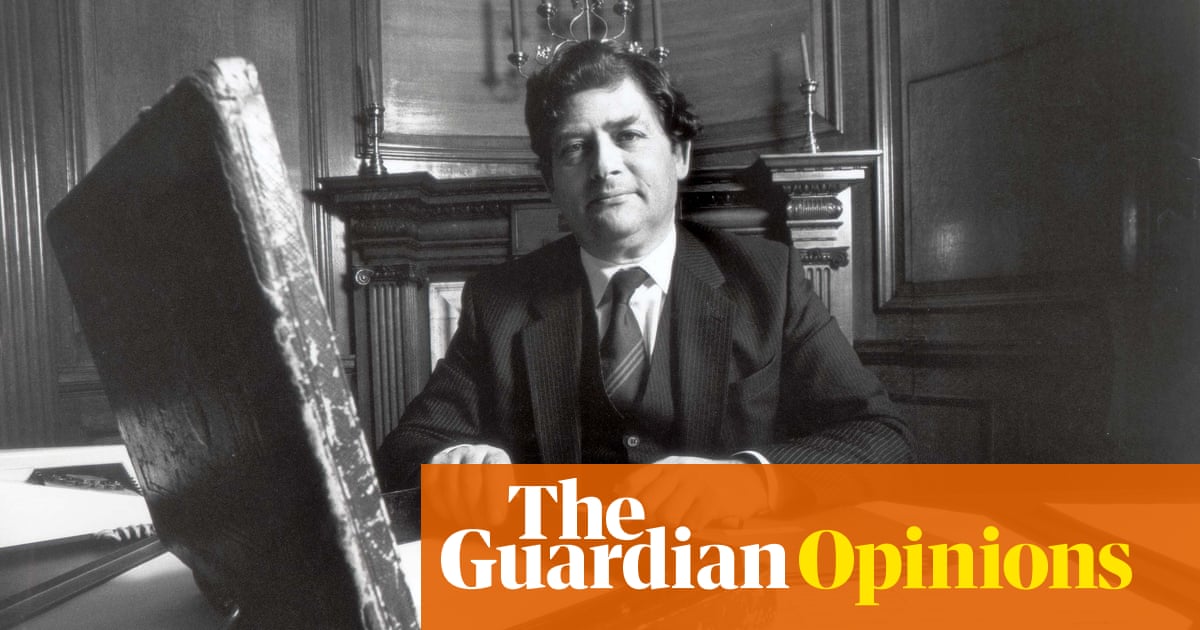
In death this week at the age of 91, Nigel Lawson has been saluted by all wings of the Conservative party as a prophetic thinker and Tory exemplar for our times. Rishi Sunak led the way in this response, posting a photograph of himself as chancellor that showed one of his own first actions in the Treasury was to hang a portrait of Lawson on his wall.
There can be no disputing that, between 1983 and 1989, Lawson was an immensely significant and consequential Tory chancellor. Nor that, at his peak, he was one of the most influential ministerial figures of the Margaret Thatcher decade. He then wrote the most important memoir by any senior figure of those years. But it is a big mistake, and a destructively common one in the modern Tory party, to see him as a changeless icon for today.
The Lawson of the 1980s possessed an allure that is rare among major politicians of any era. Time spent with Lawson back then was never wasted. By political standards, he was a big and serious thinker. He was kind, too. I remember a group of Westminster journalists agreeing that in the unlikely event that we were ever compelled to spend a summer holiday with a member of the Thatcher cabinet, our unanimous choice would be Lawson.
Yet Lawson’s legacy for the Britain and for the Tory party of the 2020s is double-edged. Carefully handled, aspects of his radicalism still have relevance and meaning today that cannot be dismissed. Other aspects are anachronistic and full of danger, especially if they are regarded as dogma.
Lawson was the chancellor who did more than anyone else to create the economic model that Britain still lives with today. Alongside Thatcher, and after Geoffrey Howe, he was the arch-tax-cutter, the arch-privatiser and the arch-deregulator of the 1980s. That is why he was lauded by so many Tories this week, and why he arouses such animosity among Labour supporters.
The political success of those measures is also part of the reason why New Labour was apprehensive about tampering with what Lawson had bequeathed, why Britain was so inadequately equipped for the financial crash of 2008, so badly prepared for the austerity of the following decade, so welcoming to kleptocrat oligarchs and tax-avoiding corporations, so defenceless against the increasing wealth gulf of the modern era, so deaf to the low-pay crisis in the public services and the gig economy, and so limited in the financial options now available to any government operating since the pandemic and in the cost of living crisis.
This is not to say that everything Lawson did in the 1980s was unjustified in every degree. The postwar economic model Thatcher inherited in 1979 no longer worked. But it is to say that Lawson bet the national interest on a set of assumptions about markets and government that, though they delivered great prosperity for many for a sustained period, are no longer doing so to anything like the same degree. Today, it is the turn of the Lawson model to be the one that is no longer working. What he did in the 1980s is not the off-the-peg solution for the 2020s that so many Conservatives, not merely Liz Truss, believe.
If there was a golden thread to Lawson’s career, it was his wariness of, and discomfort with, consensus. This is the second part of Lawson’s legacy, particularly within the Tory party. “I’m always on the alert when there is a consensus. There is no debate. That’s lazy,” he once said.
It was reflex that helps explain why Lawson was a pro-European chancellor who became a Brexiteer, an apostle of fiscal discipline who fed a boom that turned into a recession, and an admirer of rational scrutiny who revolted against climate science. Thatcher famously called him unassailable. Shortly afterwards, however, he walked out of her cabinet after one too many disagreements.
He called himself “a committed unbeliever.” But the unbelief stretched beyond the Jewish faith, into which he was born. He was clever and he was admired. But he was ultimately an individualist, a cat who walked by himself, a Tory who did not join clubs, a square peg, a contrarian.
The contrarianism and distaste for consensus are, I suspect, Lawson’s unintended, corrosive legacy to the divided Tory party of today. Because his own career managed to combine cleverness, market-driven liberalism, contrarianism and success, he has provided a model that other, lesser politicians have tried to emulate in less advantageous times.
It is partly because of the allure of Lawson’s example that the modern Tory party has flirted so disastrously with other contrarians and consensus-defiers, such as Dominic Cummings, Kwasi Kwarteng and Truss. It is why Kemi Badenoch, the latest apostle of contrarian cleverness, is still so highly regarded.
The days of the Tories as the stupid party, as John Stuart Mill once dubbed them, are long gone. The modern Tory party is now addicted to a particular and deeply unconservative notion of cleverness. But it is an abstract cleverness, with little interest in the everyday or the traditional, and which conspicuously lacks both wisdom and judgment. Lawson did not create this oddly perverse version of the Tory party, but he gave it respectability. He succeeded because he was cleverer than most, and because the time was right. Neither of these things is true of those who try to emulate him in the transformed circumstances of today.
Martin Kettle is a Guardian columnist












